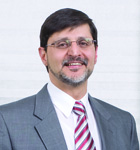
Some people wonder how Majd (“modged”) Alwan, a pedigreed engineer, ended up in the field of eldercare technologies. He’s used to the curiosity.
“Yes, I’m an engineer and some people believe I’m a convert, a social scientist…. Sometimes people think that I have a nursing background,” he says with amusement. “But my first degree is engineering.”
While it’s not the most traditional career path, it is apparent that Alwan feels at home in his position as director of the Center for Aging Services Technologies at the American Association of Homes and Services for the Aging. He sees his field’s potential to make an enormous impact—both in helping to prevent falls, and monitoring seniors to keep them at home longer.
He also is a proponent of what he calls “therapeutainment” (you saw it here first!), which combines mind-enhancing exercises with physical stimulation. The Nintendo Wii is one example.
Alwan’s vast knowledge of senior-care technology is a boon for CAST, says Zachary Sikes, senior vice president for business relations and corporate development at AAHSA. But Alwan’s bigger contribution is his ability to translate the science behind the technology into terms of business, academia and long-term care.
“He takes his responsibilities and the opportunity of what this can do for our providers and our aging population very, very seriously,” Sikes says.
Alwan, who is originally from Damascus, Syria, got his first glimpse into his field of biomedical engineering while working toward his master’s and doctorate degrees in the United Kingdom. For his dissertation, he designed a wheelchair that, theoretically, could respond to voice commands.
His accumulated work and education experiences helped land him a position at The Medical Automation Research Center in the Department of Pathology at the University of Virginia. He worked there on applying technology to the geriatric population. He currently has six patents that are related to technology for seniors.
His dream goal, he says, is to see the societal benefits from the technologies developed at the University of Virginia “on a much larger scale and taken advantage of to deliver care to a broader population.”
His professional drive is, in part, personal: His mother, who lives in Damascus under the care of one of Alwan’s sisters, is completely bedridden and can no longer speak.
“It hurts more that I’m working in this area of technologies and I feel so helpless,” says Alwan, the youngest of 10 children.
Today, living near Washington, D.C., Alwan still maintains a strong connection to his country’s culture. He and his family (wife, Rana, who is from Jordan; and daughters, Maryam, 6, and Heba, 2) speak Arabic at home. Moslem by faith, Alwan attends a nearby mosque on Fridays, celebrates Ramadan, and gives back to his community.
Like his vast understanding of technology and its universal implications, Alwan sees the world from a global perspective.
“At the end of the day, I feel we’re all human,” he says, “and we all share a lot more sets of beliefs than what is on the surface.”
_____
Resume
1988
Earns bachelor’s degree in electrical and electronic engineering, University of Damascus, Syria
1992
Receives M.S. in control engineering, University of Bradford, United Kingdom
1997
Earns doctorate in electrical and electronic engineering, University of London, U.K.
1998
Lecturer and researcher at the Automation Department, Higher Institute of Applied Sciences and Technology, Damascus
2002
Director of Robotics and Eldercare Technologies Program, The Medical Automation Research Center, University of Virginia
2007
Co-founds Home Guardian LLC,
Charlottesville, VA
2007
Takes position in May as director of AAHSA’s Center for Aging Services Technologies in Washington, D.C.
From the January 01, 2009 Issue of McKnight's Long-Term Care News





